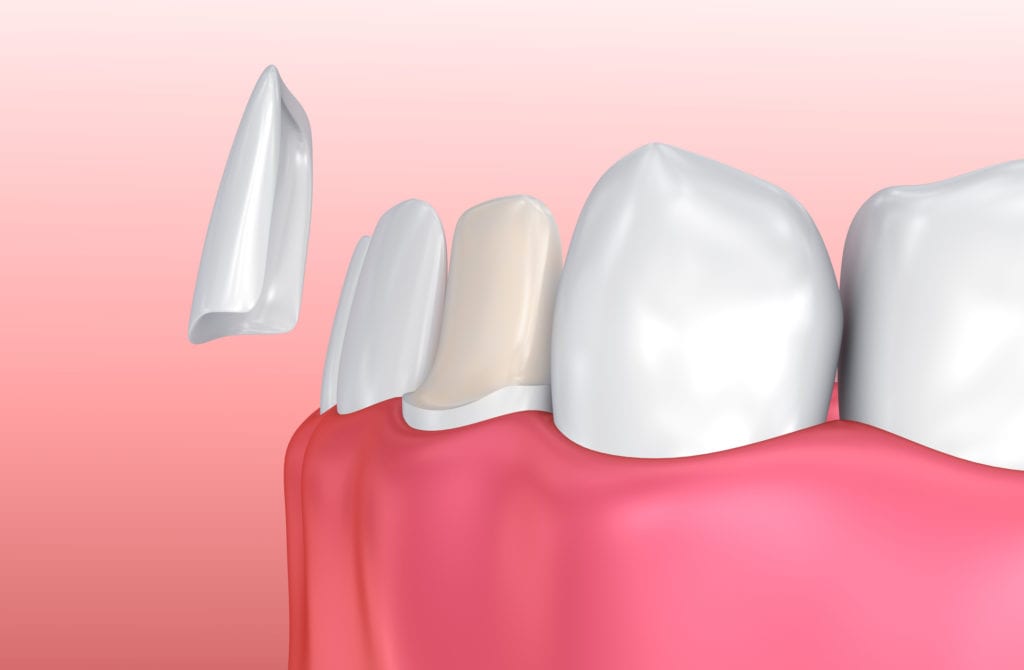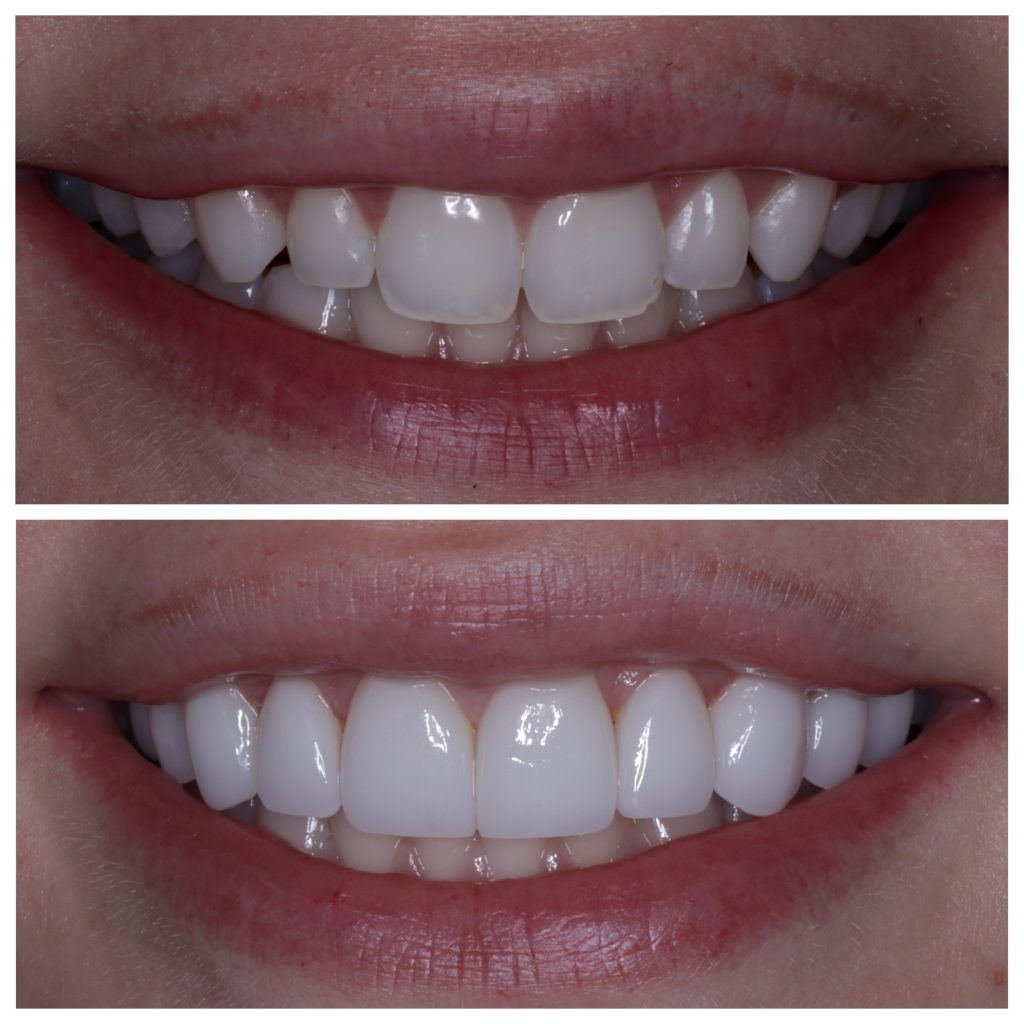Dental Veneers Cost, Procedure, and Aftercare Explained
Wiki Article
The Total Introduction of Veneers: Types, Uses, and Their Influence on Your Smile
Veneers act as a prominent service for individuals looking for to improve their dental aesthetics. These custom-crafted shells can successfully mask imperfections such as discoloration and gaps. With 2 key types available, porcelain and composite material, each offers distinctive advantages and restrictions. The influence of veneers extends beyond simple look, influencing self-worth and social interactions. Comprehending their kinds and advantages is crucial. What might this imply for one's general lifestyle?Understanding Veneers: What They Are and Exactly how They Function
Veneers are slim coverings, generally made from porcelain or composite resin, that are custom-crafted to fit over the front surface area of teeth. They serve both visual and useful purposes, offering an option for numerous oral blemishes such as discoloration, gaps, and minor misalignments. By adhering to the tooth enamel, veneers create a natural appearance while improving the shape and color of the teeth.The procedure generally includes an initial appointment, where a dental expert analyzes the individual's demands and talks about preferred outcomes - Dental Veneers. Following this, a very little amount of enamel might be removed to suit the veneer. Impressions of the teeth are then taken to guarantee an accurate fit. Once made, the veneers are adhered safely to the teeth making use of an unique oral adhesive. This procedure not only enhances the smile's appearance however also aids shield the underlying teeth from additional damage, making veneers a popular choice for several seeking a smile transformation
Sorts of Veneers: Porcelain vs. Compound Material
The difference in between porcelain and composite resin veneers hinges on their material make-up and features. Each type offers differing degrees of cost, toughness, and longevity, influencing clients' choices based on their specific needs. Recognizing these differences is crucial for making an educated decision regarding oral enhancements.Material Differences Clarified
While both porcelain and composite resin veneers serve the very same cosmetic purpose, they vary substantially in material buildings, resilience, and aesthetic end results. Porcelain veneers are crafted from a ceramic material that imitates the all-natural transparency of teeth, giving a lifelike appearance. Their smooth surface is immune to discoloration, making them an enticing alternative for those seeking a resilient visual. On the other hand, composite resin veneers are made from a tooth-colored plastic material, using adaptability and convenience of application. Nevertheless, they may not accomplish the exact same degree of brightness or translucency as porcelain. Additionally, composite veneers can be a lot more easily shaped and repaired, making them a more versatile alternative in certain dental scenarios. Each type presents distinct benefits customized to specific choices.Long life and Sturdiness
Longevity and durability are significant factors when contrasting porcelain and composite material veneers. Porcelain veneers are recognized for their strength, commonly lasting 10 to 15 years with appropriate care. Their resilience versus staining and chipping makes them a favored option for people looking for long-lasting results. On the other hand, composite material veneers normally have a shorter lifespan, balancing 5 to 7 years. While they can be repaired extra conveniently if harmed, they are much more susceptible to put on and discoloration over time. The selection between these products typically depends upon the person's way of life, aesthetic objectives, and maintenance choices. Ultimately, recognizing the distinctions in long life and longevity can assist clients in picking the veneer type that ideal suits their demands.Cost Contrast Insights
When selecting in between porcelain and composite resin veneers, expense is a crucial factor to consider. Porcelain veneers generally vary from $800 to $2,500 per tooth, reflecting their toughness, visual appeal, and resistance to discoloration. These veneers call for a more substantial treatment and specialized laboratory work, adding to their greater rate tag. In comparison, composite resin veneers are normally much more cost effective, setting you back between $250 and $1,500 per tooth. They can be applied in a single see, which minimizes labor costs. Composite veneers may need much more regular substitutes, potentially boosting long-lasting costs. Eventually, the choice between porcelain and composite material veneers depends upon specific budgets and wanted outcomes, stabilizing preliminary costs versus longevity and visual outcomes.The Advantages of Choosing Veneers for Your Smile
Choosing veneers supplies significant advantages for those looking for an improved smile. Their boosted visual charm can change the look of teeth, while their stain-resistant residential properties guarantee a long lasting illumination - Porcelain Veneers Dentist. This mix makes veneers a preferred alternative for individuals wanting to achieve a flawless smileBoosted Aesthetic Appeal
When individuals look for to enhance their smiles, veneers commonly become a favored remedy due to their transformative aesthetic benefits. These slim shells, generally made of porcelain or composite resin, can effectively hide flaws such as chips, gaps, and imbalance. By simulating the natural look of teeth, veneers offer a smooth, glowing smile. Their adjustable nature permits a customized method, enabling people to select shades and forms that best fit their facial functions. Additionally, veneers can develop an uniform look, enhancing general facial balance. This aesthetic improvement not only improves confidence however can likewise positively affect personal connections and social communications, making veneers a preferred selection for those looking to attain a brighter, much more attractive smile.Stain Resistance Advantages
Veneers not just enhance visual appeal yet likewise provide substantial tarnish resistance, making them an appealing option for individuals worried concerning preserving a brilliant smile. Made up of resilient materials such as porcelain or composite material, veneers are much less permeable than natural teeth, which aids avoid the absorption of discolorations from usual culprits like coffee, tea, and red white wine. This intrinsic stain resistance enables individuals to enjoy their preferred drinks without stressing over staining. Dental Veneers. In addition, the smooth surface area of veneers makes them easier to clean, additional enhancing their longevity and keeping their immaculate look. Because of this, veneers offer a useful service for those looking for both elegance and capability in their oral treatmentThe Refine of Obtaining Veneers: What to Anticipate

Although the procedure of obtaining veneers may seem intimidating, understanding the steps involved can reduce issues. Originally, an examination with a dental expert is needed to identify if veneers are the appropriate option for the individual's oral concerns. Throughout this appointment, the dental professional will sites discuss wanted end results and take impressions of the teeth.
Next off, a second appointment is arranged for tooth preparation, where a tiny amount of enamel is typically gotten rid of to fit the veneers. Temporary veneers may be positioned while visite site the custom-made ones are crafted in a dental laboratory, which typically takes a number of weeks.
When all set, the dental expert will position the veneers, guaranteeing proper fit and shade before bonding them to the teeth utilizing an unique adhesive. After final changes, the dental professional will certainly provide support on care. Comprehending these actions can aid individuals feel more comfy and educated throughout the veneer process.
Maintenance and Look After Your Veneers
Preserving veneers requires consistent like guarantee their longevity and look. Appropriate dental health is necessary; cleaning twice daily with a non-abrasive tooth paste and flossing routinely assist prevent plaque accumulation around the veneers. In addition, routine dental examinations are vital for keeping an eye on the problem of the veneers and addressing any type of possible issues early on.When biting to stop damages, individuals need to avoid hard foods and excessive force. It's also recommended to limit intake of staining substances, such as coffee, tea, and merlot, as these can affect the veneers' color in time.

Transforming Your Smile: Real-Life Effect of Veneers
A radiant smile can greatly enhance one's self-confidence and total appearance. For many people, veneers work as a transformative solution, effectively dealing with various dental concerns such as visit this web-site staining, gaps, and misalignment. These thin coverings, personalized to fit over the front of the teeth, can develop a harmonious and aesthetically pleasing smile.Real-life cases highlight the extensive effect veneers can have. Individuals often report a prompt boost in self-esteem and social communications following their procedure. The newfound confidence can lead to even more opportunities in personal and expert life, as people feel more inclined to involve and share themselves.
In addition, the psychological advantages extend past simple look; many experience enhanced mental health as they accept their smiles. As a result, veneers not only boost physical attributes but additionally contribute significantly to total high quality of life, underscoring their worth in aesthetic dentistry.
Often Asked Concerns
For How Long Do Veneers Typically Last Prior To Needing Substitute?
Veneers usually last between 10 to 15 years prior to requiring substitute. Variables such as oral health, dental routines, and the sort of material utilized can influence their long life and total longevity. Regular dental check-ups are recommended.Can Veneers Be Eliminated, and if So, Just how?
Yes, veneers can be gotten rid of. A dental expert typically uses customized tools to meticulously remove them from the teeth, making certain marginal damages to the underlying enamel, usually adhered to by necessary modifications or reconstructions for suitable looks.Are Veneers Suitable for Everybody's Oral Problem?

Will Getting Veneers Pain or Require Anesthesia?
Obtaining veneers typically involves minimal discomfort, and lots of clients receive regional anesthesia to assure a pain-free experience. Level of sensitivity might occur momentarily afterward, but a lot of discover the procedure tolerable and are pleased with the results.Exactly How Do Veneers Affect Tooth Sensitivity After Placement?
Veneers can momentarily enhance tooth level of sensitivity as a result of the elimination of enamel and the bonding process. A lot of individuals experience a reduction in sensitivity in time as the teeth readjust to the new veneers.Veneers are slim coverings, generally made from porcelain or composite resin, that are custom-crafted to fit over the front surface area of teeth. Porcelain veneers are crafted from a ceramic product that mimics the natural transparency of teeth, giving a realistic appearance. Porcelain veneers commonly range from $800 to $2,500 per tooth, reflecting their sturdiness, visual allure, and resistance to staining. In contrast, composite resin veneers are usually more inexpensive, setting you back between $250 and $1,500 per tooth. Made up of long lasting materials such as porcelain or composite resin, veneers are less porous than all-natural teeth, which assists prevent the absorption of stains from usual perpetrators like coffee, tea, and red a glass of wine.
Report this wiki page